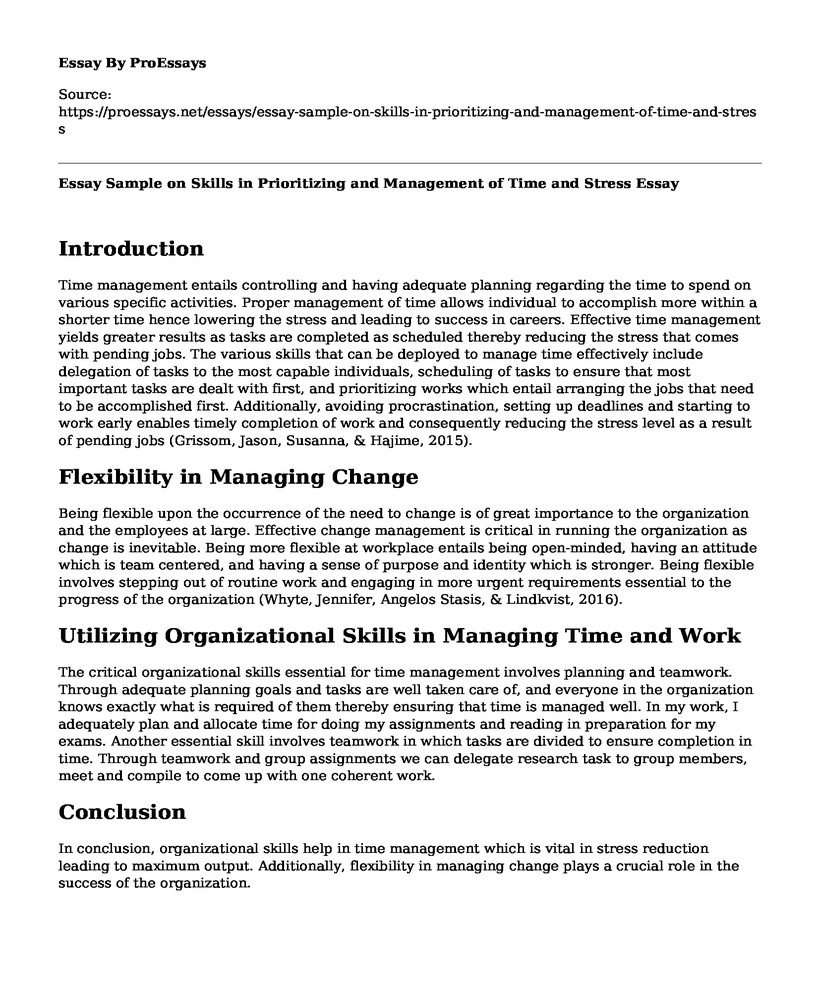Introduction
Time management entails controlling and having adequate planning regarding the time to spend on various specific activities. Proper management of time allows individual to accomplish more within a shorter time hence lowering the stress and leading to success in careers. Effective time management yields greater results as tasks are completed as scheduled thereby reducing the stress that comes with pending jobs. The various skills that can be deployed to manage time effectively include delegation of tasks to the most capable individuals, scheduling of tasks to ensure that most important tasks are dealt with first, and prioritizing works which entail arranging the jobs that need to be accomplished first. Additionally, avoiding procrastination, setting up deadlines and starting to work early enables timely completion of work and consequently reducing the stress level as a result of pending jobs (Grissom, Jason, Susanna, & Hajime, 2015).
Flexibility in Managing Change
Being flexible upon the occurrence of the need to change is of great importance to the organization and the employees at large. Effective change management is critical in running the organization as change is inevitable. Being more flexible at workplace entails being open-minded, having an attitude which is team centered, and having a sense of purpose and identity which is stronger. Being flexible involves stepping out of routine work and engaging in more urgent requirements essential to the progress of the organization (Whyte, Jennifer, Angelos Stasis, & Lindkvist, 2016).
Utilizing Organizational Skills in Managing Time and Work
The critical organizational skills essential for time management involves planning and teamwork. Through adequate planning goals and tasks are well taken care of, and everyone in the organization knows exactly what is required of them thereby ensuring that time is managed well. In my work, I adequately plan and allocate time for doing my assignments and reading in preparation for my exams. Another essential skill involves teamwork in which tasks are divided to ensure completion in time. Through teamwork and group assignments we can delegate research task to group members, meet and compile to come up with one coherent work.
Conclusion
In conclusion, organizational skills help in time management which is vital in stress reduction leading to maximum output. Additionally, flexibility in managing change plays a crucial role in the success of the organization.
Works Cited
Grissom, Jason A., Susanna Loeb, and Hajime Mitani. "Principal time management skills: Explaining patterns in principals' time use, job stress, and perceived effectiveness." Journal of Educational Administration 53.6 (2015): 773-793. Accessed from https://www.emeraldinsight.com/doi/abs/10.1108/JEA-09-2014-0117
Whyte, Jennifer, Angelos Stasis, and Carmel Lindkvist. "Managing change in the delivery of complex projects: Configuration management, asset information, and 'big data.'" International Journal of Project Management 34.2 (2016): 339-351. Accessed from https://www.sciencedirect.com/science/article/pii/S0263786315000393
Cite this page
Essay Sample on Skills in Prioritizing and Management of Time and Stress. (2022, Dec 18). Retrieved from https://proessays.net/essays/essay-sample-on-skills-in-prioritizing-and-management-of-time-and-stress
If you are the original author of this essay and no longer wish to have it published on the ProEssays website, please click below to request its removal:
- Aging Parents Essay Example
- Risk Evaluation and Mitigation Strategies
- Place, Product, Price, and Promotion Essay
- Implementation of Changes by Government Paper Example
- Essay Sample on Knowledge Competencies as the Emphasis on Organizational Growth and Approach
- Essay Example on FORD's Transformation: Crafting a New Vision.
- Addressing Substance Abuse in Schools: Challenges, Interventions, and Comprehensive Policies - Free Report







